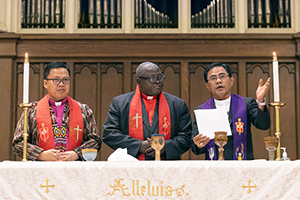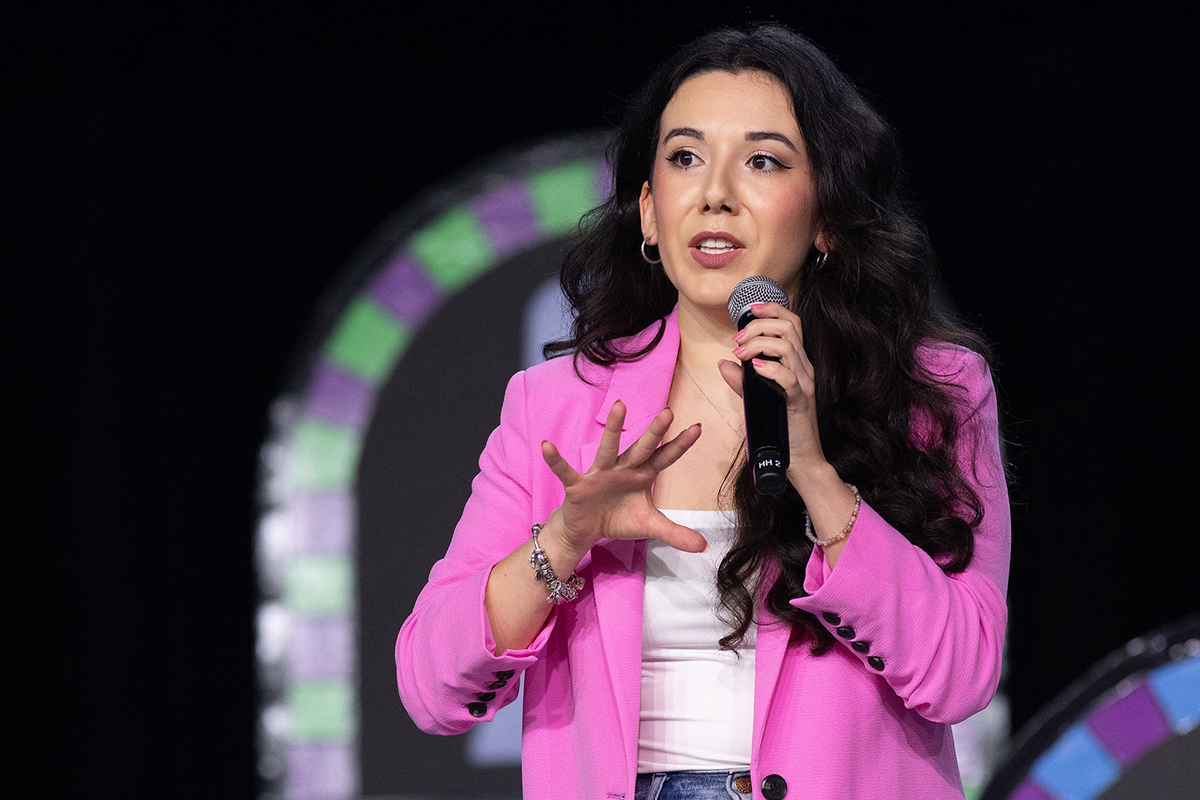Key points:
- Young delegate Alejandra Salemi of Florida said she sees similarities between the current state of the church and a family torn apart due to divorce.
- Senesie T.A. Rogers of Sierra Leone said splits are not new to the Methodist Church and he believes there is hope for a bright future and unity.
- The Young People’s Address is a highlight of General Conference, said Chris Wilterdink, director of Young People’s Ministries for United Methodist Discipleship Ministries.
Young people have likened the current happenings in The United Methodist Church to a divorce with devastating effects on the children, but they asserted there is hope for a bright future.
To thunderous applause, Alejandra Salemi of the Florida Conference said the denomination’s lawmaking assembly is being held “in the midst of what feels like an emotional whirlpool that only something like divorce proceedings can stir up.”
“We’ve tried to call what our church has gone through over the past season many things — a schism, a separation, a split, disaffiliations … and no matter what we call it, it still feels, to me, like a divorce,” she said.
Salemi told delegates attending the postponed 2020 General Conference that the younger generation is feeling the weight of the emotional, mental and spiritual trauma that comes with separation and disaffiliations.
Over the past four years, more than 7,600 U.S. congregations have disaffiliated from The United Methodist Church over how inclusive to be of LGBTQ people in the life of the church.
“When time and money and energy go towards a divorce, it has to get subtracted from somewhere else, and I believe that our young people and local congregations are paying that price while resources go toward settling disagreements,” she said.
She said what is happening in the church is a microcosm to what is happening in the rest of the world and the most difficult thing to hear in an echo chamber is the quiet, knowing voice of the truth: God’s loving whisper that reminds people “to be still and know.”
Despite those concerns, Salemi said there is hope for The United Methodist Church.
“I know many people feel that what is about to unfold with this body during the General Conference is inevitable. But, be still and know … however the cards fall, we will find a way forward. We always have and we always will.”
Salemi has battled with anxiety over the past four years, which she said was mainly caused by worrying about the wellbeing of her family and whether she would lose a loved one during the COVID-19 pandemic. It worsened due to a consistent stream of hate crimes, extremism, political uncertainty and climate disaster.

General Conference photos
The National Institute of Mental Health estimates that about one in three people struggle with some sort of anxiety, making it the most common mental health illness worldwide.
Salemi said she believes that even in the darkest of days, there is so much beauty and goodness and worth in humanity.
“If you can’t have hope right now, that is OK; I will have enough hope for the both of us. And then maybe when the gray storm clouds sweep over my soul, you can have enough hope for you and I in exchange,” she said.
Across the ocean, Senesie T.A. Rogers, who was unable to get a visa to travel to the U.S from his home in Sierra Leone, delivered his recorded address, reminding delegates that splits were normal in the Methodist Church.
“An inconvenient truth in our tradition is that the seeds needed to explore dividing the church were planted in the first General Conference in 1792, which was attended only by clergy. We have thereafter felt the effects of nine splits and one major schism in the first 100 years, or so, of the Methodist Church,” he said.
Because of that history, he said, it is pointless to worry about splits and their effects when we already know that splits and Methodism are intertwined.
“Do you know that there is something else that is part of our tradition? Indeed. Reconciliation and coming together is part of our tradition. We must be more about uniting than dividing at this point,” Rogers said.
He referenced the conference theme — “Know that I am God,” from Psalm 46:10 — noting that he believes that faith guarantees that in the midst of every persecution and every decision, hearts can find comfort and encouragement in the words, “Be still and know that I am God.”
Salemi and Rogers were selected by the Division on Ministries with Young People at Discipleship Ministries, which organizes the Young People’s Address as an opportunity for young United Methodists to witness about the church’s impact on their own lives and the lives of others.
Subscribe to our
e-newsletter
Chris Wilterdink, director of Young People’s Ministries for United Methodist Discipleship Ministries, said young people are facing challenging times. Economic pressures, the cost of living, especially housing, continues to rise, while unemployment and wage growth continue to be difficult to navigate. Older generations continue to work longer and delay retirement, limiting the opportunities for young people to grow professionally.
Some church members have delayed or opted out of pursuing theological education or beginning the process of becoming clergy because they doubt there will be churches or an organization that can provide a job or a living wage upon completion of their process, Wilterdink said.
He also noted that some young people were not provided with adequate information or access to voting during local church disaffiliation processes, resulting in a sense of disenfranchisement.
In years past, he said, the percentage of young delegates (younger than age 35) at General Conference has generally hovered between 5% and 12% of the total. This year, that percentage is even lower, because some who were elected as young adult delegates before the years of postponements are no longer of an age to be defined as a young adult.
Wilterdink said the young people’s address is always a highlight of General Conference
“It is a chance for young people to declare boldly their hope for the future and the reality of the now, using honesty and transparency. It is a chance to speak life into the process of conferencing, so that potential harm can be both recognized and minimized.”
Chikwanah is a correspondent for UM News based in Harare, Zimbabwe.
News media contact: Julie Dwyer at (615) 742-5470 or newsdesk@umnews.org. To read more United Methodist news, subscribe to the free daily or weekly Digests.



